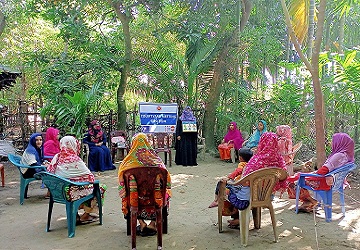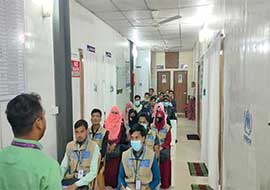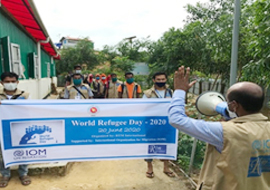HIV/AIDS
Bangladesh is vulnerable to an HIV epidemic due to the prevalence of behavior patterns and risk factors that facilitate the rapid spread of HIV. Bangladesh government, NGOs, and donors are putting priority to HIV/AIDS prevention. RTM International is working in HIV/AIDS prevention projects for the last ten years. It is also an active member of Bangladesh STI /AIDS network.
The following AIDS-related trainings projects and activities have been performed by RTM International:
The following AIDS-related trainings projects and activities have been performed by RTM International:
Program:
| |
• | Bangladesh AIDS Program: RTM International was a partner of FHI
Bangladesh in the implementation of a three-year ’Bangladesh AIDS
Program’ (2005-2008) funded by USAID. In the program RTM International
worked to promote the accountability of the implementing NGOs in project
implementation and augment their planning and management skills
necessary to build a more sustainable program. It worked for NGO
capacity building to design, implement, monitor and evaluate HIV
prevention program. RTM International implemented a project "Advocacy on STI/HIV/AIDS in two selected municipalities by women ward commissioners" with financial assistance from UNICEF. The project aimed to develop an effective community partnership leading to increase in awareness on STI/HIV/AIDS among the communities of Syedpur and Parbatipur Municipalities. The project period was September 2005-June 2006. |
Research :
| |
• | Injecting Drug Users (IDU): RTM International was commissioned in
September 2004 by Family Health International (FHI), Bangladesh Country
Office, to undertake a study entitled "Assessment of Injecting Drug
Users ’(IDUs) Sexual Network and Risk Behavior in Indonesia and
Bangladesh’. This study probed into the sexual behavior of IDUs in
Bangladesh who are considered to be the most vulnerable among the at
risk populations to contract HIV/AIDS. |
| |
• | Behavioral Surveillance Survey (BSS) 2006-2007: Currently RTM
international worked on BSS 2006-’07 which was undertaken to document
behaviors leading to vulnerability for HIV infection among ten selected
population groups: Injecting drug user, Heroin Smokers, Hijra, MSM, MSW,
Hotel based sex workers, Street based sex workers, Brothel based sex
workers, Rickshaw Puller and Truckers and to determine trends of
behaviors over the rounds of surveillance. In this project data were
collected from 7200 respondents of ten high risk groups from different
geographical locations of Bangladesh. |
| |
• | Rapid Situation Assessment: FHI Bangladesh assigned RTM International the
task of conducting Rapid Situation Assessment in 3 selected areas to
gather strategic information on the magnitude of most at risk groups’
(injecting drug users, hijra, male having sex with male, male sex
workers and female sex workers) prevailing situation with regard to
their risk behavior and networking. These tasks where completed by 30
September 2006. |
Training:
| |
• | Strengthening Syndromic Approach to RTI/STI case Management, Prevention
of HIV/AIDS, Infection Prevention, and Post-Abortion Care Services: In
association with Marie Stopes Clinic Society, Bangladesh, RTM
International provided 6 day training to 256 doctors and paramedics
working in 64 Maternal and Child Welfare Centers throughout Bangladesh.
It also provided one-day orientation to 3200 district, Upazila and union
level GoB health officials to make them aware of the program and how it
would benefit the mothers and children. The duration of the project was
one year (August 2003 - September 2004). |
| |
• | RTM International conducted a Refresher training on RTIs/STIs and
Infection Prevention to the Health and Nutrition center staff of UNHCR
(especially nurses & paramedics) who serve the Maynmar refugees in
two camps a part of the overall plan to enhance their capacity to render
better quality service. |
| |
• | Capacity Building of BSWS: RTM International was commissioned by Family
Health International, Bangladesh Country Office, to build the
programmatic, administrative and financial capacity of a local NGO
’Bandhu Social Welfare Society’ (BSWS) working for prevention of
HIV/AIDS (April-June 2005). |
-
Current Information
-
Activities Pictures
RTM International are implementing Health Support and research activities in the different Districts of Bangladesh which are funded by different Donors.
RTMI-UNFPA Project

Courtyard meeting organized by RTMI-UNFPA
RTMI-UNHCR Project

CHW training on scabies prevention
RTMI-IOM Project

World Refugee Day - 2020
